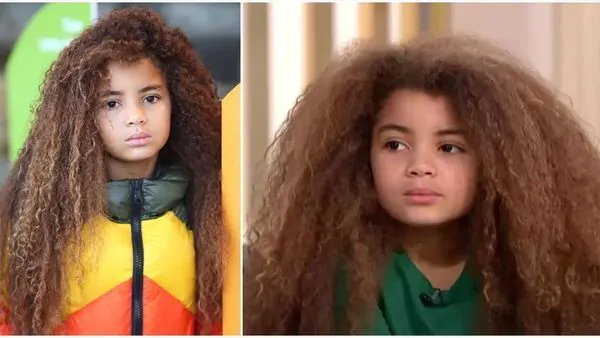Do you remember your school days? The moments that made you happy and the ones that made you sad? We all have memories of the strict rules we had to follow. While some of them made sense, like no jewelry during sports, others seemed unnecessary and just a waste of time. Punishing kids for things like wearing too much makeup or having a soda just didn’t make sense. These outdated rules often clash with a child’s desire to be different and express themselves.
Imagine if I told you that an 8-year-old boy was denied a good education simply because of his long hair. Meet Farouk James, a London-born child model with stunning hair that has caught the attention of modeling scouts all over the world. Despite his success as a model, Farouk has been rejected by multiple schools because of the length of his hair.
Forcing children to conform to these appearance rules goes against their human rights, according to Farouk’s mother, Bonnie Miller. Determined to make a change, she took to Instagram and wrote, “I will not give up trying to persuade governments to put legislation in place to protect children from these outdated, punishing rules.” She even started a petition on Change.org to ban hair discrimination in schools in the U.K. Bonnie, Farouk, and their supporters, known as the “Mane Generation,” are determined to fight for global change regarding these unfair rules.

Despite the love and support Farouk receives online, negative comments still find their way to his family. Bonnie shared her frustrations last year, saying, “Farouk’s hair is a God-given part of him, and he will not be cutting it to appease anyone.” She argues that appearance rules for both boys and girls are old-fashioned and sometimes even racially biased, with schools banning hairstyles like dreadlocks and braids.
Farouk’s hair is an important part of his identity. Rejecting a child because of their hair is just not acceptable in 2022. Bonnie will keep fighting for Farouk and others who face discrimination for expressing their cultural heritage.
Bonnie Miller’s quest for fairness and inclusivity has sparked a global conversation about outdated rules that limit children’s self-expression. Her fight against denying education because of appearance is gaining momentum, with people from all walks of life joining forces to support the cause.
Hair discrimination is not just a problem in the U.K. It’s an issue that affects children all around the world. By sharing Farouk’s story and the experiences of many others, Bonnie is advocating for a global change in these unfair rules.
Bonnie and the Mane Generation are determined to challenge these discriminatory rules. They believe that no child should be denied an education or face prejudice because of how they look. Together, they are demanding a fair and inclusive educational system that celebrates diversity.
Social media has played a crucial role in spreading awareness about Farouk’s story. Bonnie’s Instagram posts have caught the attention of people from all over the world. The support they’re receiving not only gives strength to Bonnie and Farouk but also elevates their campaign for change.
Hair holds immense cultural and personal significance for individuals everywhere. It is a vital part of one’s identity and heritage. Rejecting a child based on their hair length is a form of discrimination that has no place in modern society. As Bonnie rightly points out, appearance rules for boys and girls are based on outdated practices that perpetuate inequality.
The struggle for acceptance and equality continues. Bonnie Miller’s unwavering determination to challenge outdated school rules and fight for the rights of children like Farouk is an inspiration to us all. Their story reminds us that change is possible when we come together to challenge unfair norms.
Let’s stand with Bonnie, Farouk, and the Mane Generation, supporting their fight for inclusive education and the right to express one’s identity without fear of discrimination. Together, we can ensure that no child is denied an education or subjected to outdated rules simply because of how they look. It’s time to rewrite the story and create a future where every child can thrive, regardless of their hairstyle.
